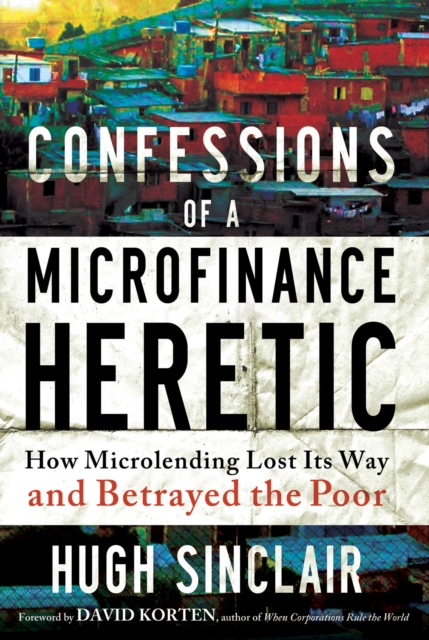
Confessions of a Microfinance Heretic : How Microlending Lost Its Way and Betrayed the Poor EPUB
by Hugh Sinclair
EPUB
Please note: eBooks can only be purchased with a UK issued credit card and all our eBooks (ePub and PDF) are DRM protected.
Description
This memoir by a microfinance insider “is essential reading for anyone interested in development economics, a disturbing and yet ultimately hopeful exposé” (John Perkins, New York Times bestselling author of Confessions of an Economic Hitman).
This is the account of a microfinance true believer whose decade in the industry turned him into a heretic. Working with several microfinance institutions around the world, Hugh Sinclair realized that the $70 billion industry wasn’t doing much to help the people it claimed to serve. In fact, exorbitant interest rates led borrowers into never-ending debt spirals, and aggressive collection practices resulted in cases of forced prostitution, child labor, suicide, and nationwide revolts against the microfinance community.
Sinclair weaves a shocking tale of a system increasingly focused on maximizing profits—particularly once large banks got involved. He details his discovery of several scandals, one of the most disturbing involving a large African microfinance institution of questionable legality that charged interest rates in excess of one hundred percent per year and whose investors and supporters included some of the most celebrated leaders of the microfinance sector.
Sinclair’s objections were first met with silence, then threats, attempted bribery, and a court case, and eventually led him to become a principal whistleblower in a sector that had lost its soul. Microfinance can work—Sinclair describes moving experiences with several ethical and effective organizations and explains what made them different. But without the fundamental reforms that Sinclair recommends here, microfinance will remain an “investment opportunity” that will leave the poor with hollow promises and empty pockets.
This is the account of a microfinance true believer whose decade in the industry turned him into a heretic. Working with several microfinance institutions around the world, Hugh Sinclair realized that the $70 billion industry wasn’t doing much to help the people it claimed to serve. In fact, exorbitant interest rates led borrowers into never-ending debt spirals, and aggressive collection practices resulted in cases of forced prostitution, child labor, suicide, and nationwide revolts against the microfinance community.
Sinclair weaves a shocking tale of a system increasingly focused on maximizing profits—particularly once large banks got involved. He details his discovery of several scandals, one of the most disturbing involving a large African microfinance institution of questionable legality that charged interest rates in excess of one hundred percent per year and whose investors and supporters included some of the most celebrated leaders of the microfinance sector.
Sinclair’s objections were first met with silence, then threats, attempted bribery, and a court case, and eventually led him to become a principal whistleblower in a sector that had lost its soul. Microfinance can work—Sinclair describes moving experiences with several ethical and effective organizations and explains what made them different. But without the fundamental reforms that Sinclair recommends here, microfinance will remain an “investment opportunity” that will leave the poor with hollow promises and empty pockets.
Information
-
Download - Immediately Available
- Format:EPUB
- Publisher:Berrett-Koehler Publishers
- Publication Date:09/07/2012
- Category:
- ISBN:9781609945206
Other Formats
- PDF from £19.57
Information
-
Download - Immediately Available
- Format:EPUB
- Publisher:Berrett-Koehler Publishers
- Publication Date:09/07/2012
- Category:
- ISBN:9781609945206






